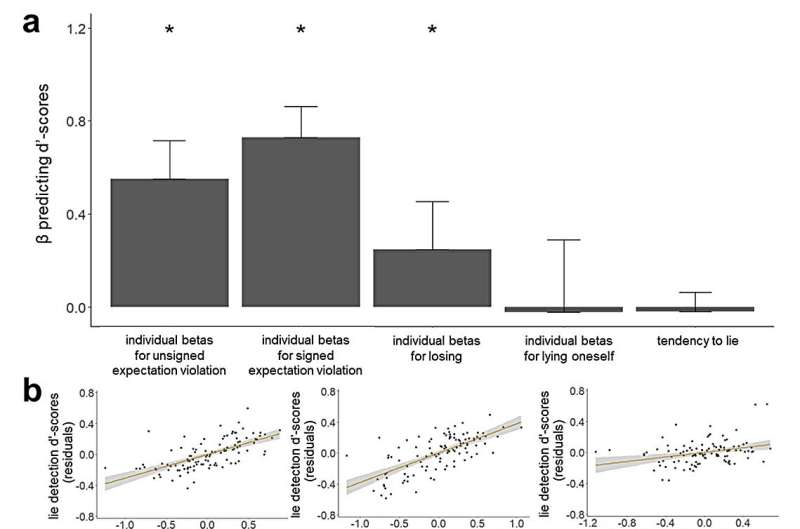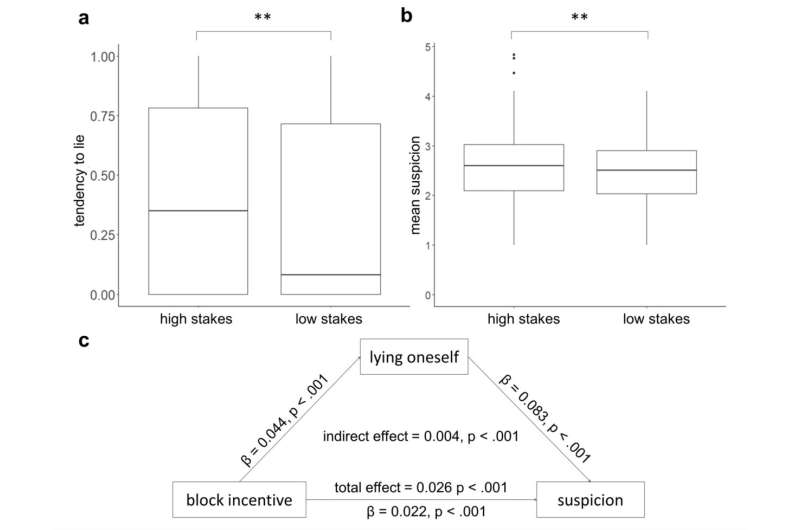April 2, 2024 feature
This article has been reviewed according to Science X's editorial process and policies. Editors have highlighted the following attributes while ensuring the content's credibility:
fact-checked
trusted source
proofread
Exploring the factors that influence people's ability to detect lies online

The internet has given rise to new forms of deceit and misinformation, including phishing attacks, romance scams and fake news. While many psychological studies have investigated the factors that influence people's ability to tell if others are lying in person, lie detection online has seldomly been explored.
Researchers at University College London (UCL) and Massachusetts Institute of Technology (MIT) recently carried out a study aimed at better understanding why people are deceived online. Their paper, published in Communications Psychology, outlines interesting patterns underlying the detection of lies online.
"People all around the world have been losing billions to online scams year on year," Tali Sharot and Sarah Zheng, co-authors of the paper, told Medical Xpress. "This trend has worsened since the COVID-19 pandemic and is worsening with the advent of generative AI. Now, before we can help people detect online scams, we need to understand why people fall for them in the first place."
As both scams and fake news are rooted in lies, Zheng, Rozenkrantz and Sharot first reviewed past literature focusing on lie detection. They found that most previous works focused on offline contexts, where people can also try to detect lies based on subtle cues, such as a person's tone of voice, their gaze and body language.
"In online settings, we typically cannot rely on such cues," Sharot and Zheng explained. "We thus set out to study why people can be particularly bad at detecting lies, and thus scams, in an online context."
Zheng, Rozenkrantz and Sharot conducted three experiments involving 310 people who were asked to take part in an online card game played in pairs. As part of this game, they were given some information about how likely it was for them to be dealt each card from a deck. Notably, certain cards would result in winning money, while others might cause a financial loss.

Participants could choose to lie about the card they received, as this could allow them to win more money at the expense of another player. The participants were never instructed to lie; hence the decision of whether to be truthful or not was solely theirs.
"At the end of each play, participants rated how honest they thought the other player was," Sharot and Zheng said. "We examined what cues people used to judge others' honesty. For example, did they think others lied when they themselves did? Did they think others lied when the other person reported having a rare card? And did they think others lied when they themselves lost?"
When they analyzed the data they collected, the researchers observed two fascinating patterns. First, they observed that people were more suspicious of others if they had themselves lied during the game, but also when other players had reported holding a statistically unlikely card.
Zheng, Rozenkrantz and Sharot also compared the behavior of players to the predictions of an artificial, simulated lie detector, Interestingly, they found that poor lie detection was associated with an over-reliance on one's own honesty (or dishonesty) and an under-reliance on statistical cues.
"These findings imply that honest people may be particularly susceptible to scams, because they are the least likely to suspect a lie and thus detect a scam," Sharot and Zheng explained. "Moreover, as social media platforms use recommendation systems that feed people with more of the same content they like, these systems distort the likelihood of seeing certain information—fake news included. People's natural reliance on statistical likelihoods to infer what is true thus will not work well in these contexts."
This recent work by Zheng, Rozenkrantz and Sharot sheds some new light on the factors underpinning people's ability to detect others' deceptions online. In the future, they could guide the efforts of policymakers and technology firms who are working to prevent internet users from falling into the traps of scammers and platforms disseminating false information.
"Our findings led to the idea of creating an 'adversarial training' to help people detect online scams," Sharot and Zheng added. "That is, people may get better at detecting scams after engaging with scam creation themselves. Initial results looking at detection of phishing e-mails look promising and we now aim to test this further in other contexts."
More information: Sarah Ying Zheng et al, Poor lie detection related to an under-reliance on statistical cues and overreliance on own behaviour, Communications Psychology (2024). DOI: 10.1038/s44271-024-00068-7
© 2024 Science X Network





















